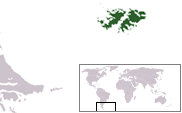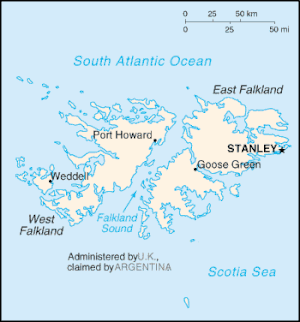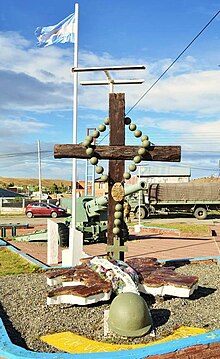| Revision as of 07:23, 25 September 2005 view source201.250.140.84 (talk)No edit summary← Previous edit | Revision as of 08:29, 25 September 2005 view source Icairns (talk | contribs)76,837 edits removing POV-check to discussion page - since there is no current discussionNext edit → | ||
| Line 1: | Line 1: | ||
| {{POV check}} | |||
| {| border="1" cellpadding="2" cellspacing="0" style="margin: 0 0 1em 1em; float: right; width: 290px;" | {| border="1" cellpadding="2" cellspacing="0" style="margin: 0 0 1em 1em; float: right; width: 290px;" | ||
| |+ <big>'''The Falkland Islands'''</big> | |+ <big>'''The Falkland Islands'''</big> | ||
Revision as of 08:29, 25 September 2005
| |||||
| Motto: Desire the right | |||||

| |||||
| Official language | English | ||||
| Capital | Port Stanley | ||||
| Governor | Howard Pearce | ||||
| Chief Executive | Chris Simpkins | ||||
| Area - Total - % water |
not ranked 12,173 km² - | ||||
| Population - Total (2003 E) - Density |
not ranked 2,967 0.24/km² | ||||
| Currency | Falkland pound (FKP; fixed to GBP) | ||||
| Time zone | UTC -4 (DST -3) | ||||
| National anthem | God Save the Queen | ||||
| Internet TLD | .fk | ||||
| Calling code | 500 | ||||
The Falkland Islands are an archipelago in the South Atlantic continental shelf consisting of two main islands, East Falkland and West Falkland, and a number of smaller islands. They are administered as a largely self-governing overseas territory of the United Kingdom (UK) from Port Stanley, also known as Stanley, the capital and largest city, on East Falkland.
Argentina also claims the islands, calling them by their Spanish name, Islas Malvinas (similarly calling the capital Puerto Argentino), and considers them part of the Tierra del Fuego Province. The islands appear on every Argentine map, in Argentine weather forecasts, and even some tour guides to Argentina.
Argentina launched an attack in 1982 and successfully occupied the islands. Under British Prime Minister Margaret Thatcher, the British sent a fleet and, in June, removed the Argentine army and navy from the islands and their vicinity. This conflict is called the Falklands War in English, and 14 June is Liberation Day on the Falkland Islands and South Georgia and the South Sandwich Islands. Almost every city in Argentina has a memorial to the fallen of the war and a street named Malvinas Argentinas. At many of the entrance points to the country and to some of the provinces there are roadside signs proclaiming Las Malvinas son Argentinas ("The Malvinas are Argentine"). 2 April is Día de los caídos en Malvinas ("Day of the fallen in the Malvinas"), a national holiday in Argentina.
The Argentines still accuse the British of colonialism and emphasise decolonisation. The British emphasise the right of the islanders, who consider themselves to be British, to self-determination. Although still a touchy diplomatic issue, relations between the two countries have improved in recent years.
History
Main article: History of the Falkland Islands
No native people lived in the islands when the Europeans arrived, although there is some disputed evidence for earlier apparently temporary human visits. The most convincing of these claims is the existence of the Falkland Island fox or Warrah, possibly descended from the South American culpeo used as hunting dogs by the Yaghan people of Tierra del Fuego. Some say that it is unlikely to have reached the islands by itself. However, between Bahía Blanca, Tierra del Fuego, and the Falklands is a large triangular shelf of seabed less than 100 metres deep, which may have become a land bridge when global sea level dropped in the last ice age. Abundant when the islands were settled by Europeans, it was considered a nuisance to livestock and hunted to extinction.
The Dutch sailor Sebald de Weert is usually credited with first sighting the Falklands in 1600, though both the British and Spanish historians maintain their own explorers discovered the islands earlier. Some older maps, particularly Dutch ones, used the name 'Sebald Islands'. The history of discovery and exploration is as follows:
- 1504: Amerigo Vespucci (Florence/Spain)
- 1520: Esteban Gómez (Spain)
- 1540: Ferdinand Camargo (Spain)
- 1592: John Davis (England)
- 1593: Richard Hawkins (England)
- 1600: Sebald de Weert (Netherlands)
- 1684: Cowley & Dampier (England) discovered Pepys Island, renamed South Georgia by James Cook in 1775.
- 1690: John Strong (England) landed, and named the sound and eventually the entire island group after Viscount Falkland, Admiralty Commissioner
- 1701: Gouin de Beauchesne (France)
- 1708: Roger Woodes (Great Britain)
- 1713: Treaty of Utrecht between Spain, France and Great Britain
- 1740: George Anson (Great Britain)
- 1764: Louis de Bougainville (France) founded a naval base at Port Louis, East Falkland. The French named them the Îles Malouines, so-called from when the islands were briefly occupied by fishermen from St Malo. Many of the settlers were Acadians left homeless by the Great Expulsion in Nova Scotia.
- 1765: Ignorant of de Bougainville's presence, John Byron (Great Britain) established a base at Port Egmont, West Falkland in 1765.
- 1766 or 1767: France sold its base to Spain.
- 1770: Spain declared war on Great Britain in a fight over the islands.
- 1771: That dispute was settled, with Spain retaining East Falkland and Great Britain West Falkland (until 1774). The Spanish claimed that a secret agreement was reached assuring continuing Spanish sovereignty over the islands, but this was denied by the British.
- 1774: The British abandoned Port Egmont but left behind a plaque re-asserting British dominion.
- 1776: Spain ruled the islands as part of the Viceroyalty of the Río de la Plata after 1776.
- 1790: Nootka Sound Convention. Britain conceded Spanish sovereignty over all Spain's traditional territories in the Americas. Whether or not the islands were included is disputed.
- 1811: The islands became uninhabited.
- 1816: The United Provinces of the River Plate, later called Argentina, gained independence from Spain.
- 1820: Argentina proclaimed sovereignty over the islands. The Argentine frigate, the Heroina, was sent to the islands to take possession of them. Argentina set up a penal colony on them.
- 1825: The United Kingdom recognized Argentina's independence from Spain.
- 1829: Argentina named Luis Vernet as the islands' governor. After a dispute over fishing rights with a United States vessel, the Argentine authorities arrested and detained the vessel's captain. The US responded by shelling the island, destroying the main settlements.
- 1833: The United Kingdom invaded the islands and expelled the Argentines, but Argentina maintained its claim. (See 1833 invasion of the Falkland Islands.)
- December 1965: United Nations Resolution 2065 called upon Britain and Argentina to "proceed without delay with negotiations with a view to finding a peaceful solution to the problem bearing in mind the interests of the population of the Falkland Islands (Malvinas)."
- 1982: Various tensions, but mainly the desire of the Argentine military junta to distract attention from domestic economic and political ills, led to an Argentine invasion. The islands were later retaken by the UK. (See Falklands War.)
Politics
Executive authority comes from the Queen and is exercised by the Governor on her behalf. Defence is the responsibility of the UK.
Under the constitution, the latest version of which came into force in 1985, there is an Executive Council and a Legislative Council. The Executive Council, which advises the Governor, is also chaired by the Governor. It consists of the Chief Executive, Financial Secretary and three Legislative Councillors, who are elected by the other Legislative Councillors. The Legislative Council consists of the Chief Executive, Financial Secretary and the eight Legislative Councillors, of whom five are elected from Stanley and three from Camp, for four year terms. It is presided over by the Speaker, currently Mr L.G. Blake.
The loss of the war against Britain over control of the islands led to the collapse of the Argentine military dictatorship in 1983. Disputes over control of the islands continue. In 2001, British Prime Minister Tony Blair became the first to visit Argentina since the war. On the 22nd anniversary of the war, Argentina's President Néstor Kirchner gave a speech insisting that the islands would once again be part of Argentina. Kirchner, campaigning for president in 2003, regarded the islands a top priority. In June 2003 the issue was brought before a United Nations committee, and attempts have been made to open talks with Britain to resolve the issue of the islands. As far as the Falkland Islands Government and people are concerned there is no issue to resolve. The Falkland Islanders themselves are almost entirely British and maintain their allegiance to the United Kingdom.
Falkland Islanders were granted full British citizenship from 1 January 1983 under the British Nationality (Falkland Islands) Act 1983.
Geography

Main article: Geography of the Falkland Islands
The islands are 300 miles (483 km) from the South American mainland. There are two main islands, East Falkland (Soledad in Spanish) and West Falkland (Gran Malvina) and about 700 small islands. The total land area is 12,173 km².
Islanders themselves talk about two main areas of the islands, namely Stanley and the rest, which they nickname "the Camp", from the Spanish campo ("countryside").
Economy
Main article: Economy of the Falkland Islands
The largest industries are fishing and agriculture. The islands have oil reserves that are believed to be quite substantial, but have yet to be exploited. The climatic conditions of the southern seas mean that the economic viability of any exploitation is poor.
Demographics
Main article: Demographics of the Falkland Islands
The population is 2,967 (July 2003 estimate).
Islanders call themselves "Islanders". Outsiders often call Islanders "Kelpers", from the kelp which grows profusely around the islands, but the name is not used in the Islands any more. The word kelper is used in Argentina with the meaning of second-class citizens as a reflection on the legal status of the islanders within the UK prior to the passing of the Nationality Act of 1983.
Culture
Main article: Culture of the Falkland Islands
Argentine claim

Argentina considers that the islands were a Spanish territory and that they passed to Argentine sovereignty when Argentina became independent in 1816 (a principle known as uti possedetis). They maintain that the islands were first discovered by Magallanes, that the Spanish bought out the French settlement and that Britain had abandoned her settlement (in 1774). The Spanish also maintained that while they allowed a British settlement on the islands, they did not concede sovereignty to the British. Further, they consider that Britain ceded its rights over the islands at the Nootka Sound Convention in 1790. When Argentina established a settlement on the islands in 1820, they were uninhabited. Thus they consider the British invasion of 1833 to have been in breach of international law. On June 17, 1833, Manuel Moreno, the Argentine ambassador to the United Kingdom, delivered a formal complaint. From that moment onwards, Argentina has always contested what they regard as the British occupation of the islands.

Another argument advanced by the Argentine governments is the fact that the islands are located on the continental shelf facing Argentina, which would give them a claim, as stated in the 1958 UN Convention on the Continental Shelf. The islands are included in the United Nations list of Non-Self-Governing Territories as territories to be considered for decolonisation.
Finally, the Argentine government states that the fact that the current population of the islands is purely British is not a valid argument for British possession of the islands, as it is a result of the British occupation of 1833, which Argentina considers to have been illegal, and in which the Argentine population was expelled by force.
In Argentina it is considered that in 1982 Argentine forces retomaron ("retook") the islands, while in the UK the word "invaded" is normally used. One of the reasons that the name Falkland Islands is rejected by Argentina is that it reflects British colonialism.
British claim
Britain claims that according to treaties signed with Spain, all land not under 'effective control' was open to colonisation even if it was within the territory allocated to Spain under the treaty of Tordesillas (an agreement made by the Catholic church between Spain and Portugal, but not recognised by any other nation).
Britain claims that the Spanish ceded sovereignty over the areas settled by the British and that Britain did not relinquish sovereignty when Port Egmont was abandoned in 1774. Furthermore Britain states that Argentina's claimed inheritance under the principle of uti possedetis is not accepted as a general principle of international law. Thus the British claim that the 1820 Argentine settlement was on British territory. Britain sees the events of 1833 as a legitimate retaking of the islands and the 1982 military efforts by Argentina as an invasion.
Britain also cites the right of the islanders to self-determination and the continuous settlement since 1833—some families have been on the islands for more than five generations—as justification for continuing British sovereignty.
One of the reasons that the name Malvinas is rejected by the British is that it reflects Argentine claims.
See also
- Communications in the Falkland Islands
- Military of the Falkland Islands
- Stamps and postal history of the Falkland Islands
- Transport in the Falkland Islands
- Battle of the Falkland Islands - naval engagement of the First World War
- British Nationality (Falkland Islands) Act 1983
- Falkland Islands Dependencies Survey
- Falklands War - conflict between Argentina and United Kingdom
- List of settlements in the Falkland Islands
- Major Samuel Stransham
Reference
- "Non-Self-Governing Territories listed by General Assembly in 2002". United Nations Special Committee of 24 on Decolonisation. March 10.
{{cite web}}: Check date values in:|date=and|year=/|date=mismatch (help)
External links
- Template:Wikitravel
- Falkland Islands Government's official website, including a detailed map
- Battles of the Falkland Islands War 1982 at Naval History Net
- Official Falkland Islands portal by the Falkland Islands Development Corporation
- BBC News: Country profiles: Falkland Islands
- Falkland Islands News Network, privately maintained
- Falkland Islands Tourism, from a company by that name
- BBC Weather for Port Stanley
- The Mad-Sheep Falkland Islands Pages
- Malvinas History (Spanish)
| Countries, territories and dependencies of the British Crown | |
|---|---|
| Countries of the United Kingdom | |
| Crown Dependencies | |
| Overseas territories |
|
| Former colonies | |
| Sovereign Base Areas. Partial suspension of sovereignty due to the Antarctic Treaty. | |